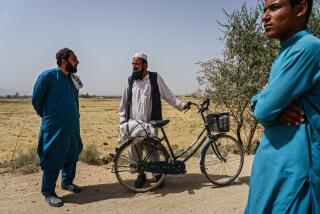U.S. death toll in Afghanistan was 1 last month
KABUL, AFGHANISTAN — One American serviceman died in Afghanistan in November, a significant drop from earlier months that the U.S. military attributed to its campaign against insurgent leaders, operations by Afghan and Pakistani forces and the onset of winter.
Twice this year, monthly U.S. death tolls in Afghanistan surpassed the monthly tolls in Iraq, highlighting the differing trends in the two war zones: Security in Iraq has improved, while it has deteriorated in Afghanistan.
U.S. troops suffered an average of 21 deaths in Afghanistan each month this year from May to October -- by far the deadliest six-month period in Afghanistan for American forces since the 2001 U.S.-led invasion. The Afghan Defense Ministry does not release fatality figures.
Militants this year have unleashed increasingly powerful roadside bombs and sophisticated, multidirectional ambushes. The deadlier attacks, combined with a record number of U.S. troops patrolling Afghanistan’s vast provinces, have this year led to more American military deaths than ever before in Afghanistan -- 152, according to the independent website icasualties.org.
The sole U.S. military death recorded last month came when a suicide bomber rammed his car into a military convoy Nov. 13 as it was passing through a crowded market in eastern Afghanistan. The blast killed Spc. Jonnie L. Stiles, 38, who was serving with the Louisiana Army National Guard.
Army Lt. Col. Rumi Nielson-Green, spokeswoman at the U.S. base at Bagram, cautioned that one month of data does not make a trend “but may be an indicator.”
But she noted that operations conducted by U.S. forces in the summer against insurgent areas and bomb-making networks helped lessen November’s violence. Those efforts probably contributed to a 40% drop in roadside bomb attacks in October, compared with September, and may have pushed down troop deaths last month as well.
Insurgents in Afghanistan, particularly in mountainous areas, typically scale back operations in the colder months, and that may also have contributed to the declining trend, U.S. military spokesman Army Col. Jerry O’Hara said.
More to Read
Sign up for Essential California
The most important California stories and recommendations in your inbox every morning.
You may occasionally receive promotional content from the Los Angeles Times.










